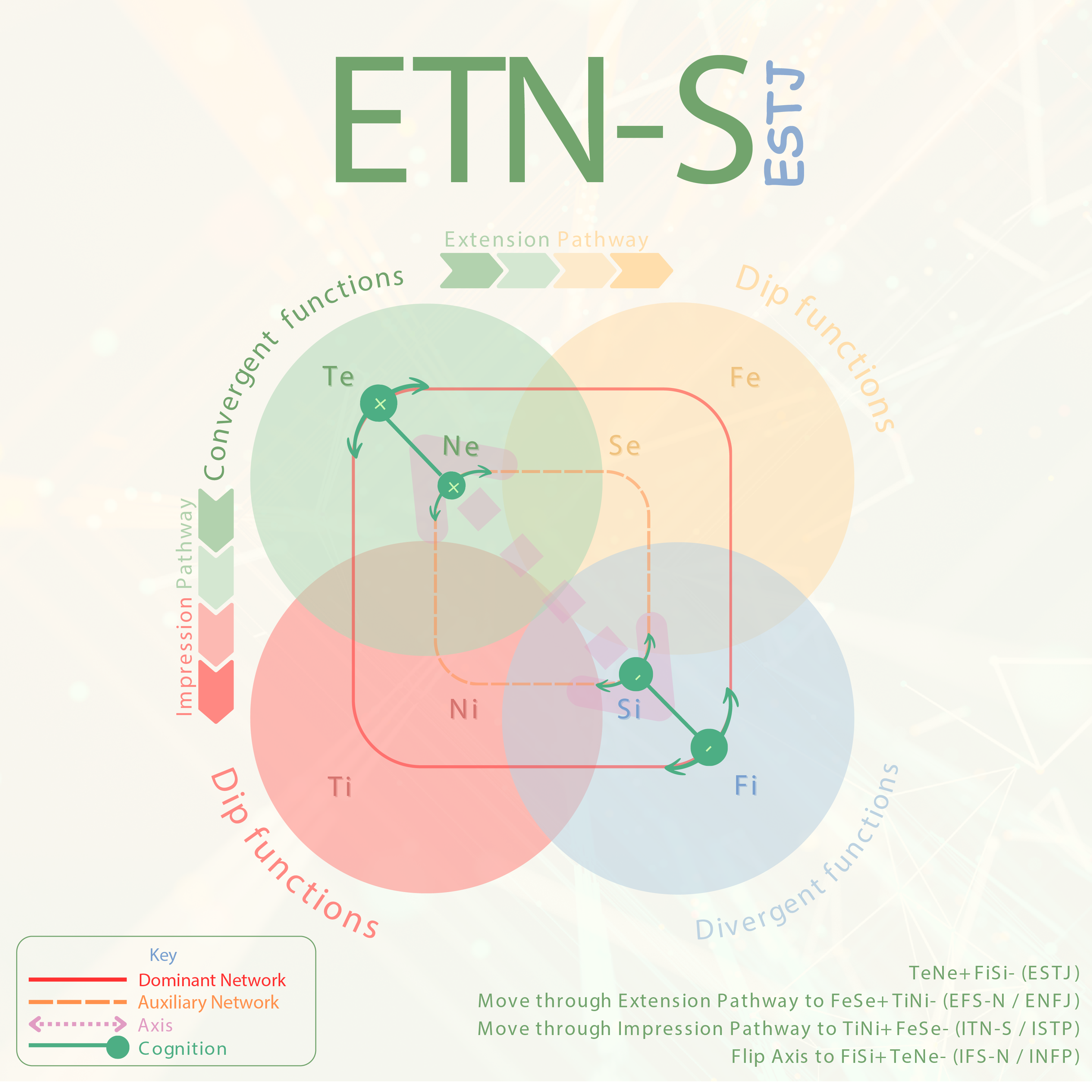
The ESTJ, also known as eTN in Cognitive Personality Theory (CPT), is a practical and community-focused type characterised by their dominant Extraverted Thinking (Te), agency Extraverted Intuition (Ne), authority Introverted Sensing (Si), and oppositional Introverted Feeling (Fi). This combination makes for someone who realises potential across the interacting contexts they are exposed to, driven by core and hard-coded human needs.
Dominant Position: Extraverted Thinking (Te)
As the dominant function, Extraverted Thinking (Te) provides the ESTJ with a focus on external variables and practical implementation. This function excels at organising, planning, and executing tasks to maintain their environment, help others fulfill their potential, as well as realise their own.
How it Feels: For the ESTJ, Te dominance means being constantly aware of the external landscape and how it can be best interacted with to maintain a sense of interobjective external harmony. They are always on the lookout for useful resources and strategies to maximise their impact, making them highly project-oriented and coordinated in their approach.
Agency Position: Extraverted Intuition (Ne)
In the agency position, Extraverted Intuition (Ne) provides the ESTJ with a natural curiosity and exploratory tendency. Ne is fast-switching and enables them to connect various ecosystems together, ensuring they are always ready to discover new opportunities and possibilities.
How it Feels: With Ne as their agency function, ESTJs can effectively engage with their environment, exploring and connecting different contexts. They invest their ego in their ability to innovate and adapt, making them dynamic and adventurous in their pursuits.
Authority Position: Introverted Sensing (Si)
Introverted Sensing (Si) in the authority position acts as a guiding bedrock for the ESTJ, ensuring they have a consistent and reliable foundation. Si provides a sense of stability and tradition, helping them to maintain a steady and dependable environment.
How it Feels: Si in this position can feel like an internal anchor, constantly grounding the ESTJ in their core values, attachments, and resources. This function helps them maintain a clear sense of stability and order, ensuring that their actions are aligned with their long-term goals and needs.
Oppositional Position: Introverted Feeling (Fi)
In the oppositional position, Introverted Feeling (Fi) serves as a delicate yet essential function. Fi provides the ESTJ with a sense of authenticity and personal integrity, ensuring their actions are aligned with their inner values and coremost needs. However, it can also be a source of tension as it generates needs and desires that must be realised.
How it Feels: Fi in the oppositional position often feels like a subtle, yet powerful undercurrent driving the ESTJ’s actions. While it can be a source of internal conflict due to its sensitivity, it also provides valuable insights into their deeper needs and motivations. This function encourages them to stay true to themselves, even as they navigate complex external landscapes.
Cognitive Dynamics and Dip Functions
The ESTJ’s cognitive dynamics are characterised by their ability to leverage external variables and connect different contexts through Te-Ne. This type excels at realising potential across various environments, ensuring their goals are achieved efficiently and effectively.
Dips:
TeNe - FeSe: Forming deeper bonds with others in order to tune in to a heartfelt connection. This dip often ensues an ESTJ taking another under their wing, or forming a deep commitment.
TeNe - TiNi: Integrating important categories into a general sense of contextual prioritisation as well as an innovative tendency to bring forth new systems into the world.
FiSi - TiNi: Understanding the larger categories and emergent layers of reality the self is a part of. This dip gives many of this type a more mystical and spiritual leaning as they align a core sense of self with emergent forces beyond discrete human understanding.
Conclusion
The ESTJ (eTN) is a highly communal type that thrives well in an ecosystemic (e.g., team-based) environment, provided their own desire for autonomy and authority is met. Their dominant Extraverted Thinking (Te) drives them to leverage external variables and take strategic action, while their agency Extraverted Intuition (Ne) ensures they remain curious and exploratory. The authority Introverted Sensing (Si) provides a consistent foundation, and the oppositional Introverted Feeling (Fi) ensures they remain true to their inner values. Together, these functions create a personality that excels at realising potential across various contexts, making them highly effective and dynamic leaders and community builders.
Illustrations by Rivka B.